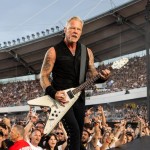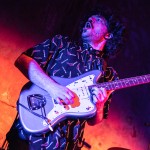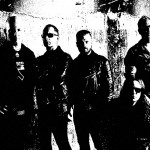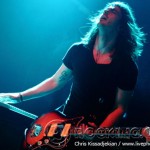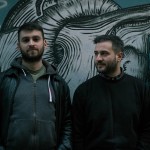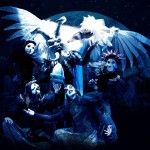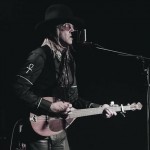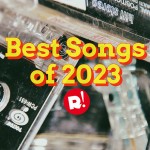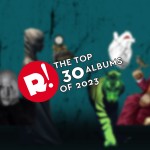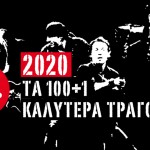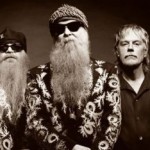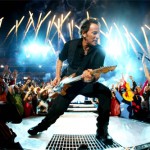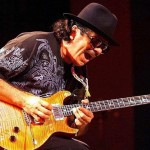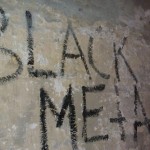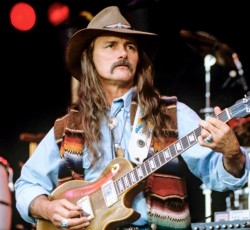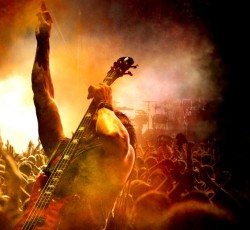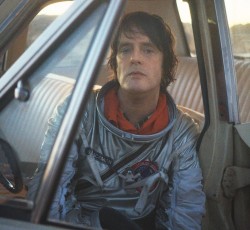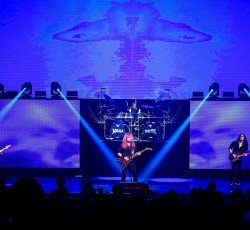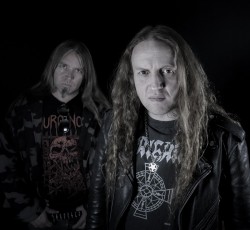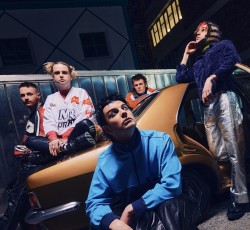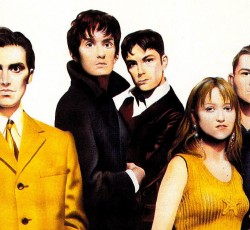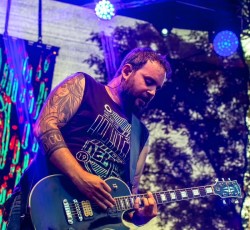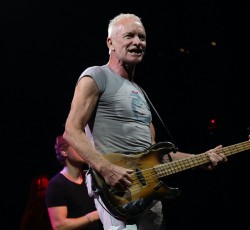Diagonal interview: "It is frustrating to see the endless articles and cover features time and time again about Yes, Rush and ELP"
18/01/2013 @ 13:23
With a stunning debut a few years ago, the British band Diagonal were set up in the adjacent prog rock audiences in the best possible way and succeeded even without fanfare, to become an ambitious and promising band. Having just released their "The Second Mechanism" album, we had a chat with Nick Whittaker and Nick Richards about their vision, influences and the tendency in the modern Progressive Rock sound.
Here's Diagonal!
Congratulations on your new album guys, it really delivers after a truly masterpiece that was your debut.
Nick Whittaker: Thanks! Glad you like it
Nick Richards: It has taken a while to get here. We’ve had a few obstacles to overcome since the last album, but we’re really pleased with this one.
 Is there any concept behind “The Second Mechanism”?
Is there any concept behind “The Second Mechanism”?
NR: Not really, no. There were various themes and ideas which came up during the writing of the songs, but nothing that one could really call a concept, at least not behind the music. There is a concept behind the artwork, and that was deliberately developed in order to work with the overall sound and feel of the music.
NW: It was nearly a maritime/exploration themed thing. The lyrics of Œ”Hulks” are obviously of that bent, the song that became “These Yellow Sands” used to have lyrics to do with exploration and the titles “Capsizing” and “Voyage/Paralysis” reference similar themes but I think it’s all coincidence really!
There were some lineup changes regarding your two albums, was it difficult to work as a collective?
NW: Not at all, it’s been a joy really. I was initially worried as to how it was going to work without Dan and Alex but as soon as we got together as a five-piece I knew it was going to be something special.
NR: Having fewer people in the band has definitely made the songwriting process easier, although it wasn’t really difficult before ¬ things seem to happen more quickly now. It has never been difficult to work with anyone involved with Diagonal. Alex and Dan both left the band for their own reasons, to pursue different projects and do different things. There was never any argument or falling-out. They just didn’t want to do it any more! When we decided to record the album ourselves, Alex was the obvious choice to be at the controls, because we knew how well we could work together.
 Do you think this kind of progessive rock music in general has returned nowdays to procclaim the fame it deserves?
Do you think this kind of progessive rock music in general has returned nowdays to procclaim the fame it deserves?
NW: There is definitely some great prog being made but there always has been really. As a young music fan I used to think that there was no interesting music made after about 1976 but then you hear 5UU?s, Univers Zero, Present, David Sylvian, This Heat and so much other great progressive music that was made after the 'classic' period.
NR: Who can really say how much fame this kind of music deserves? There always seems to be a lot of talk about how prog is becoming popular again, how it’s no longer a 'dirty word' like it used to be, but we certainly don't see that translating into increased exposure or opportunities to play shows and to reach a wider audience. We are still very much an unknown, underground band in terms of the wider world of music.
Which are your main musical influences as a band?
NW: There’s so much that we?re all into: it’s a real melting pot of everything from film scores to folk to metal to afro-beat. It’s exciting to try and distil all of that into one song/record.
NR: We could do a whole interview entirely about our influences!
Are there any more,behind music? The name Diagonal for example, or your artwork is somehow special and refers to your sound.
NW: I?m not sure how much our other interests influence the music. I’m studying International Relations and love football but I don’t think they’ve really had much impact on our sound!
NR: I think it’s really important to be able to offer something that’s more than just the music. I spend a lot of time thinking about the presentation of everything that we do. I’m an artist, and so the visual aspects of what we do are incredibly important to me; I love being able to create artwork and visual concepts which relate to the music and work with it to enhance the whole experience.
 How was your recording process behing the new album?
How was your recording process behing the new album?
NW: It was quite relaxed really as we were able to do it more on our own terms than the last one. We used Brighton Electric near where we all live and would book out a room for a whole weekend. We had the songs pretty rigidly worked out as far as the five of us would play them, in a live sense. After we had laid down the basics there was then the really fun process of adding bits like piano, extra synths, congas, brass and backing vocals.
NR: As much as it was possible to do was recorded live, mainly as 3-piece, and then everything else overdubbed at a later date. It is really important to us to retain as far as possible the sound of the live band, but to be able to combine that sound with all the rest of the things you can create in a studio. That’s the ideal.
Do you have some ideas and presenting them to the others, or you Œre working as a band in the studio all together improvising?
NR: Our process is a combination of both really, but the majority of ideas come about through improvising together in the rehearsal room. We record everything we do, we pick out parts that we like and continue to work on them. It could be a rhythm, a guitar riff or whatever. When we have a few different parts we like, and which we think relate to each other, we will start trying to turn them into a song. Sometimes it all happens very easily, and sometimes it ends up going nowhere, and we abandon ideas completely.
NW: Improvisation is a very important part of how we write, after all, improvising is just spontaneous composition really. But it is also valuable to work on things individually, bring them to a rehearsal and then see what comes of them when they are played by everybody. Some of my favourite music manages to marry to rigidity of complex composition with the spontaneity of improvisation and hopefully that is something that we touch on.
 Because the album sound refers somehow to a jazzy meets prog kind of stuff.
Because the album sound refers somehow to a jazzy meets prog kind of stuff.
NW: I think that’s right: composed music with improvisation occurring also.
How important is for the band to have an analog sound reminding the classic 70?s stuff? Do you feel this kind of process returned full time for the prog bands in general?
NW: I think if it sounds good then it doesn’t matter whether it’s analog or not. We’re not as interested in that as I think we used to be. The important thing is the result. Analog can have a really great warmth to it but then if digital can create something similar there is no problem.
NR: I tend to be of the opinion that you should use whatever technology is necessary to achieve the results you want to achieve. I’m a bit of an obsessive when it comes to valve amps and guitar pedals and stuff, and I have no time for software which attempts to re-create the sounds of vintage amps, but I’m certainly not one of these anti-digital, backwards-looking people. To me it just seems self-defeating. It is 2013 after all.
Do you feel that is there an English prog scene nowdays? Is the press giving you the opportunity to be introduced in a new fanbase?
NW: I’m sure there are other bands in England playing prog too but a lot of our interest tends to come from continental Europe. The fact though that Classic Rock now do a regular magazine dedicated to prog I suppose means that there is a mainstream forum for the sort of music we do. It’s about size and scale though: we?re not a huge band yet so we’re not as 'sellable' in a magazine as other acts. These magazines could do a big feature on Diagonal but a lot of people would probably think: 'who the hell are Diagonal? I’m not buying that magazine'. So it is probably safer to do another thing on Steven Wilson.
NR: It is frustrating to see the endless articles and cover features time and time again about Yes, about Rush, about ELP, as though no bands worth talking about have come along in the last 40 years. As a relatively new band it would be fantastic to get a little more exposure in the press, but they just don’t seem interested. If there is a prog scene in terms of other bands playing live doing similar stuff to us, I’m not aware of it. There are bands here and there around the country, but given how hard we find it to get gigs I think we’re a long way away from being part of any sort of scene.
 Which are your future plans?
Which are your future plans?
NW: More shows and more writing! We’d love to play abroad a bit more if the opportunities come and we’re looking forward to seeing where we go next as a recording outfit too.
NR: Yes, getting some sort of tour together would be great, and playing in Europe is definitely something I want to do more of.
I guess you, as a band, are familiar with your labelmates Astra. Did you like “Black Chord”?
NR: We like Astra a lot, they are all really great guys, and it’s brilliant to have another band on the same kind of wavelength as us on the same label. I like “The Black Chord” a lot, although I have to say it hasn?t been on my stereo as often as “The Weirding”. There are elements of both albums that I love, but you can’t beat seeing them do it live.
NW: Yeah that’s a great record and we?re looking forward to playing with them in London in April; should be a great show.
Is it possible to make an European tour with them? Including Athens of course.
NR: We would love to do that. Astra toured Europe at the end of last year, so I don’t think its likely to happen soon, but let’s hope it might happen one day.
NW: That would be an opportunity that we’d definitely snap up and we’d love to come to Athens! But these things are not entirely in our own hands of course.
Thanks a lot and keep making such a great music.
NR: Thank you.
NW: Thanks for talking to us!
Here's Diagonal!
Congratulations on your new album guys, it really delivers after a truly masterpiece that was your debut.
Nick Whittaker: Thanks! Glad you like it
Nick Richards: It has taken a while to get here. We’ve had a few obstacles to overcome since the last album, but we’re really pleased with this one.
 Is there any concept behind “The Second Mechanism”?
Is there any concept behind “The Second Mechanism”?NR: Not really, no. There were various themes and ideas which came up during the writing of the songs, but nothing that one could really call a concept, at least not behind the music. There is a concept behind the artwork, and that was deliberately developed in order to work with the overall sound and feel of the music.
NW: It was nearly a maritime/exploration themed thing. The lyrics of Œ”Hulks” are obviously of that bent, the song that became “These Yellow Sands” used to have lyrics to do with exploration and the titles “Capsizing” and “Voyage/Paralysis” reference similar themes but I think it’s all coincidence really!
There were some lineup changes regarding your two albums, was it difficult to work as a collective?
NW: Not at all, it’s been a joy really. I was initially worried as to how it was going to work without Dan and Alex but as soon as we got together as a five-piece I knew it was going to be something special.
NR: Having fewer people in the band has definitely made the songwriting process easier, although it wasn’t really difficult before ¬ things seem to happen more quickly now. It has never been difficult to work with anyone involved with Diagonal. Alex and Dan both left the band for their own reasons, to pursue different projects and do different things. There was never any argument or falling-out. They just didn’t want to do it any more! When we decided to record the album ourselves, Alex was the obvious choice to be at the controls, because we knew how well we could work together.
 Do you think this kind of progessive rock music in general has returned nowdays to procclaim the fame it deserves?
Do you think this kind of progessive rock music in general has returned nowdays to procclaim the fame it deserves?NW: There is definitely some great prog being made but there always has been really. As a young music fan I used to think that there was no interesting music made after about 1976 but then you hear 5UU?s, Univers Zero, Present, David Sylvian, This Heat and so much other great progressive music that was made after the 'classic' period.
NR: Who can really say how much fame this kind of music deserves? There always seems to be a lot of talk about how prog is becoming popular again, how it’s no longer a 'dirty word' like it used to be, but we certainly don't see that translating into increased exposure or opportunities to play shows and to reach a wider audience. We are still very much an unknown, underground band in terms of the wider world of music.
Which are your main musical influences as a band?
NW: There’s so much that we?re all into: it’s a real melting pot of everything from film scores to folk to metal to afro-beat. It’s exciting to try and distil all of that into one song/record.
NR: We could do a whole interview entirely about our influences!
Are there any more,behind music? The name Diagonal for example, or your artwork is somehow special and refers to your sound.
NW: I?m not sure how much our other interests influence the music. I’m studying International Relations and love football but I don’t think they’ve really had much impact on our sound!
NR: I think it’s really important to be able to offer something that’s more than just the music. I spend a lot of time thinking about the presentation of everything that we do. I’m an artist, and so the visual aspects of what we do are incredibly important to me; I love being able to create artwork and visual concepts which relate to the music and work with it to enhance the whole experience.
 How was your recording process behing the new album?
How was your recording process behing the new album?NW: It was quite relaxed really as we were able to do it more on our own terms than the last one. We used Brighton Electric near where we all live and would book out a room for a whole weekend. We had the songs pretty rigidly worked out as far as the five of us would play them, in a live sense. After we had laid down the basics there was then the really fun process of adding bits like piano, extra synths, congas, brass and backing vocals.
NR: As much as it was possible to do was recorded live, mainly as 3-piece, and then everything else overdubbed at a later date. It is really important to us to retain as far as possible the sound of the live band, but to be able to combine that sound with all the rest of the things you can create in a studio. That’s the ideal.
Do you have some ideas and presenting them to the others, or you Œre working as a band in the studio all together improvising?
NR: Our process is a combination of both really, but the majority of ideas come about through improvising together in the rehearsal room. We record everything we do, we pick out parts that we like and continue to work on them. It could be a rhythm, a guitar riff or whatever. When we have a few different parts we like, and which we think relate to each other, we will start trying to turn them into a song. Sometimes it all happens very easily, and sometimes it ends up going nowhere, and we abandon ideas completely.
NW: Improvisation is a very important part of how we write, after all, improvising is just spontaneous composition really. But it is also valuable to work on things individually, bring them to a rehearsal and then see what comes of them when they are played by everybody. Some of my favourite music manages to marry to rigidity of complex composition with the spontaneity of improvisation and hopefully that is something that we touch on.
 Because the album sound refers somehow to a jazzy meets prog kind of stuff.
Because the album sound refers somehow to a jazzy meets prog kind of stuff.NW: I think that’s right: composed music with improvisation occurring also.
How important is for the band to have an analog sound reminding the classic 70?s stuff? Do you feel this kind of process returned full time for the prog bands in general?
NW: I think if it sounds good then it doesn’t matter whether it’s analog or not. We’re not as interested in that as I think we used to be. The important thing is the result. Analog can have a really great warmth to it but then if digital can create something similar there is no problem.
NR: I tend to be of the opinion that you should use whatever technology is necessary to achieve the results you want to achieve. I’m a bit of an obsessive when it comes to valve amps and guitar pedals and stuff, and I have no time for software which attempts to re-create the sounds of vintage amps, but I’m certainly not one of these anti-digital, backwards-looking people. To me it just seems self-defeating. It is 2013 after all.
Do you feel that is there an English prog scene nowdays? Is the press giving you the opportunity to be introduced in a new fanbase?
NW: I’m sure there are other bands in England playing prog too but a lot of our interest tends to come from continental Europe. The fact though that Classic Rock now do a regular magazine dedicated to prog I suppose means that there is a mainstream forum for the sort of music we do. It’s about size and scale though: we?re not a huge band yet so we’re not as 'sellable' in a magazine as other acts. These magazines could do a big feature on Diagonal but a lot of people would probably think: 'who the hell are Diagonal? I’m not buying that magazine'. So it is probably safer to do another thing on Steven Wilson.
NR: It is frustrating to see the endless articles and cover features time and time again about Yes, about Rush, about ELP, as though no bands worth talking about have come along in the last 40 years. As a relatively new band it would be fantastic to get a little more exposure in the press, but they just don’t seem interested. If there is a prog scene in terms of other bands playing live doing similar stuff to us, I’m not aware of it. There are bands here and there around the country, but given how hard we find it to get gigs I think we’re a long way away from being part of any sort of scene.
 Which are your future plans?
Which are your future plans?NW: More shows and more writing! We’d love to play abroad a bit more if the opportunities come and we’re looking forward to seeing where we go next as a recording outfit too.
NR: Yes, getting some sort of tour together would be great, and playing in Europe is definitely something I want to do more of.
I guess you, as a band, are familiar with your labelmates Astra. Did you like “Black Chord”?
NR: We like Astra a lot, they are all really great guys, and it’s brilliant to have another band on the same kind of wavelength as us on the same label. I like “The Black Chord” a lot, although I have to say it hasn?t been on my stereo as often as “The Weirding”. There are elements of both albums that I love, but you can’t beat seeing them do it live.
NW: Yeah that’s a great record and we?re looking forward to playing with them in London in April; should be a great show.
Is it possible to make an European tour with them? Including Athens of course.
NR: We would love to do that. Astra toured Europe at the end of last year, so I don’t think its likely to happen soon, but let’s hope it might happen one day.
NW: That would be an opportunity that we’d definitely snap up and we’d love to come to Athens! But these things are not entirely in our own hands of course.
Thanks a lot and keep making such a great music.
NR: Thank you.
NW: Thanks for talking to us!


